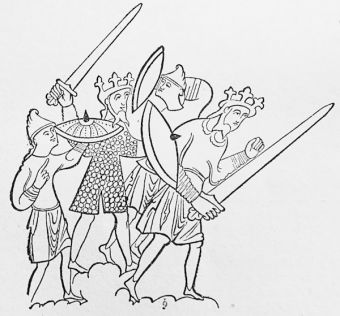
The Battle of Brunanburh
Edward was succeeded in 924 by AEthelstan, another great ruler and soldier. In his day the North sought to throw off its allegiance; and the Norsemen from Ireland, under a leader named Anlaf or Olaf, joined with the king of Scots and the people of Strathclyde to challenge the monarch who claimed to be king of all Britain.
The forces of the allies were put to utter rout in the great fight at Brunanburh, which is probably to be placed somewhere to the north of the Solway. The battle is commemorated in a fine Saxon war-song:
Clave through the shield-wall the brood of King Edward,
Hewed the war-linden with blades hammer-wrought;
Low lay the foe there, the Scots folk, the ship-folk,
Death doomed they fell.
Thick lay the heroes there scattered by javelines
O'er the shield smitten, the men of the North,
Folk too of Scotland weary, war-sated.
Forth the West Saxons in warrior bands
The live-long day
Followed the feet of the folk of the foemen;
Hewed they the flying folk, thrust through their backs amain;
Sharp were their swords.
Hard was the hand-play the Mercians refused not
To one of the warriors wending with Anlaf.
AEthelstan's victory was complete, and his supremacy was not again challenged. Meagre as are the chroniclers, we can see how mighty a king he was in the eyes of contemporaries. One of his sisters married the king of the West Franks; another married Hugh the Great, the father of Hugh Capet, whose dynasty displaced that of the descendants of Charlemagne.
Another was the wife of Otto the Great, the restorer of the Holy Roman Empire, and two more were wedded to kings. It may be remarked in parenthesis that a sister of Edward the Elder and of the Lady of Mercia was the wife of Baldwin II of Flanders and the ancestress of Matilda, the wife of William the Conqueror.
Edmund Deed-Doer and the Scottish Alliance
AEthelstan's successor was his very much younger half-brother Edmund, called the "Deed-doer," who, boy though he was, had shared the glories of Brunanburh. But his life, ended by the dagger of an assassin, was too short to enable him to fulfill its promise.
In his brief reign a northern insurrection necessitated the infliction of a sharp chastisement; and it is recorded that he gave a portion of Strathclyde to Malcolm, King of Scots, "on condition that he should be his fellow-worker both on sea and on land," which looks much more like an alliance than a submission on the part of the Scottish king.
It is exceedingly probable that about this time the Norsemen from the West (not the Danes of the Danelagh) had made themselves masters of Cumberland and Westmoreland, which are crowded with place-names of Norse not Danish origin, and that this Scottish alliance was made in order to check the danger from the Norsemen.
Edmund himself was not five and twenty when he was assassinated; and his two small boys Edwy and Edgar were passed by in favour of the last of the sons of Edward the Elder, Eadred, who displayed the family capacity and vigour, and at last succeeded in bringing the turbulent Danes of Northumbria to submission. But his reign was little longer than his brother's; and on his death Edwy, though only fifteen, was not a second time passed over.
This article is excerpted from the book, 'A History of the British Nation', by AD Innes, published in 1912 by TC & EC Jack, London. I picked up this delightful tome at a second-hand bookstore in Calgary, Canada, some years ago. Since it is now more than 70 years since Mr Innes's death in 1938, we are able to share the complete text of this book with Britain Express readers. Some of the author's views may be controversial by modern standards, particularly his attitudes towards other cultures and races, but it is worth reading as a period piece of British attitudes at the time of writing.
History
Prehistory - Roman
Britain - Dark Ages - Medieval
Britain - The Tudor Era - The
Stuarts - Georgian Britain - The Victorian Age
